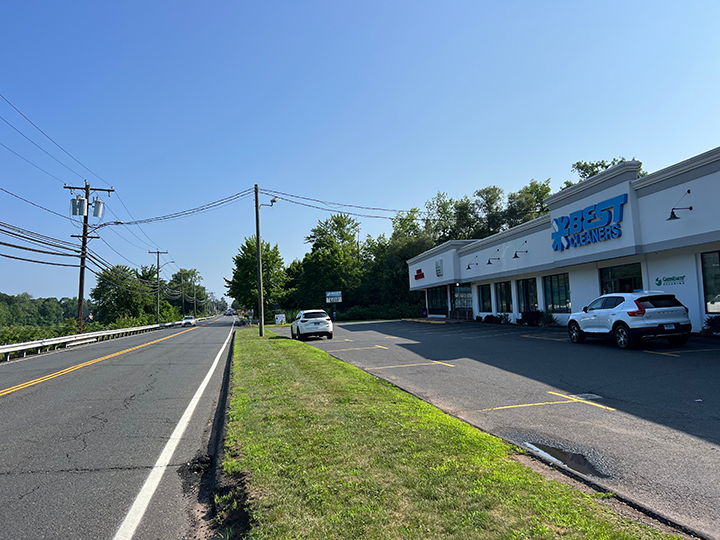
Best Cleaners Rescue Turtles on Annual Migration Path
Workers save turtles on migration path through dry-cleaning business
Washington Post | July 11, 2023 at 8:00 a.m. EDT
By Cathy Free
Every summer at Best Cleaners in Middletown, Conn., employees throw open the front and back doors and the slow parade begins. Very slow.
During nesting season from May through September, turtles ramble into the store, ease their way past the front counter and racks of freshly cleaned jackets and skirts, and crawl for the opposite door.
They’re among dozens of female Eastern painted turtles on their annual summer migration from Middletown’s Pameacha Pond to lay their eggs at a grassy marsh behind the dry-cleaning store. In late summer and early fall, the trek changes direction, with tiny hatchlings making their way back to the pond.
To head either direction, the turtles need to cross South Main Street, a busy two-lane road that is part of Route 17.
Some of the turtles are smashed by cars during their precarious annual journey, so current employees at Best Cleaners decided about five years ago to start saving as many turtles as they could, including the ones they saw wandering around the store and in the parking lot.
“I believe that people who were at the shop in the years before us also helped out,” said Matt Dionne, regional manager for Best Cleaners, adding that the Middletown South Main Street location has always opened the doors and windows every summer to help cool things off.
“When we noticed some of the turtles were coming through the shop and getting lost in a corner, we realized that helping them get to where they needed to be was something we could do,” he said.
His dog was gone when he awoke from a coma. A stranger helped reunite them.
Looking down and finding turtles in the shop is pretty common this time of year, often several times a week. That’s when the employees know it’s time to help them safely cross the street.
“The turtles are quite small, and drivers have a hard time seeing them,” Dionne said. “They’re going to make the journey across the road regardless, so why not help them out? It’s a straight line to the pond, 50 feet from the shop.”
The store’s eight employees routinely monitor the parking lot for stray turtles every summer, he said, noting that they’ll gently scoop them up and carry them to where they’re going — either to the marsh or the 19-acre pond.
“The babies can be as small as a quarter,” Dionne, 36, said. “There’s a good chance they won’t make it across the road by themselves.”
Assistant manager Jennifer Malon is among those who regularly makes a trip across the road with a turtle or two in hand. She also gives a lift to the occasional snapping turtle, but she makes sure to carry those in a dustpan.
“It’s important that we give these turtles a fighting chance to get across the road so they can live longer lives,” she said.
YouTuber pranked 8-year-old at Target, so locals gave child a shopping spree
Since the turtle migration through the store and across South Main Street was recently chronicled by the Middletown Press, more customers have been asking about the tiny reptiles, and offering to help them on the precarious journey. Malon welcomes the extra hands.
“Every summer, we’re always looking at our feet because we don’t want to step on them,” said Malon, 37. “They’re important to the environment.”
Although painted turtles are the most common turtles in North America and aren’t endangered in Connecticut like bog turtles and spotted turtles, they’re important indicators of healthy ecosystems, said Brian Hess, a wildlife biologist with Connecticut’s Department of Energy and Environmental Protection.
They’re also vulnerable to land development that imperils habitat and migration paths, he said.
“An adult turtle might survive a raccoon trying to eat it, but it can’t survive an encounter with a car,” Hess said. “Any time a turtle gets squished by a car, that’s not helping anything.”
“What they’re doing [in Middletown] is a really good thing,” he added. “Every year, we put out press releases asking people to watch for turtles and help them out during nesting season. These folks have obviously taken that advice to the next level.”
After 36 years, her plant suddenly grew a towering 25-foot stalk
Dionne hopes that rescuing the turtles will give them a better chance to make it to breeding age — usually about age 10 or so.
“Humans are the ones who built infrastructure around their habit, so we owe it to the turtles to do anything we can to give back,” Dionne said.
He and Malon were among those in Middletown who rallied last year to save Pameacha Pond from being turned into a city park. Students from Wesleyan University made an eight-minute documentary about the community’s efforts to keep the centuries-old haven for a variety of turtles, birds and frogs.
“They were going to drain the water from the pond, then because of the turtles, they decided not to,” Malon said. “A lot of people love the turtles, and they enjoy seeing them during nesting season every year. Everyone wants to keep the tradition going of helping them.”
Mac Falco, manager of the Best Cleaners shop in Middletown, said many of his customers can’t imagine a summer without seeing a few slow-moving turtles in the shop when they pick up their dry cleaning.
“It’s part of the summer experience — everyone thinks it’s wonderful that we’re helping them across,” Falco said. “I honestly don’t think many of them would make it on that busy road if someone didn’t help.”
He and other employees carefully place rescued baby turtles at the top of the pond bank across the street, then enjoy watching them climb down to the water.
Painted turtles — named for their colorful markings — are often spotted basking in the sun on rocks and logs by kayakers on the pond, Dionne said.
“They’re fascinating, instinctual little creatures with built-in GPS systems that know where the water is,” he said. “But if for some reason they end up lost in our shop, we’re happy to stop what we’re doing and pick them up.”
He said turtles in Middletown shouldn’t fear being taken to the cleaners.
“They’re safe in our hands. Turtles — who doesn’t love them?” he said.

